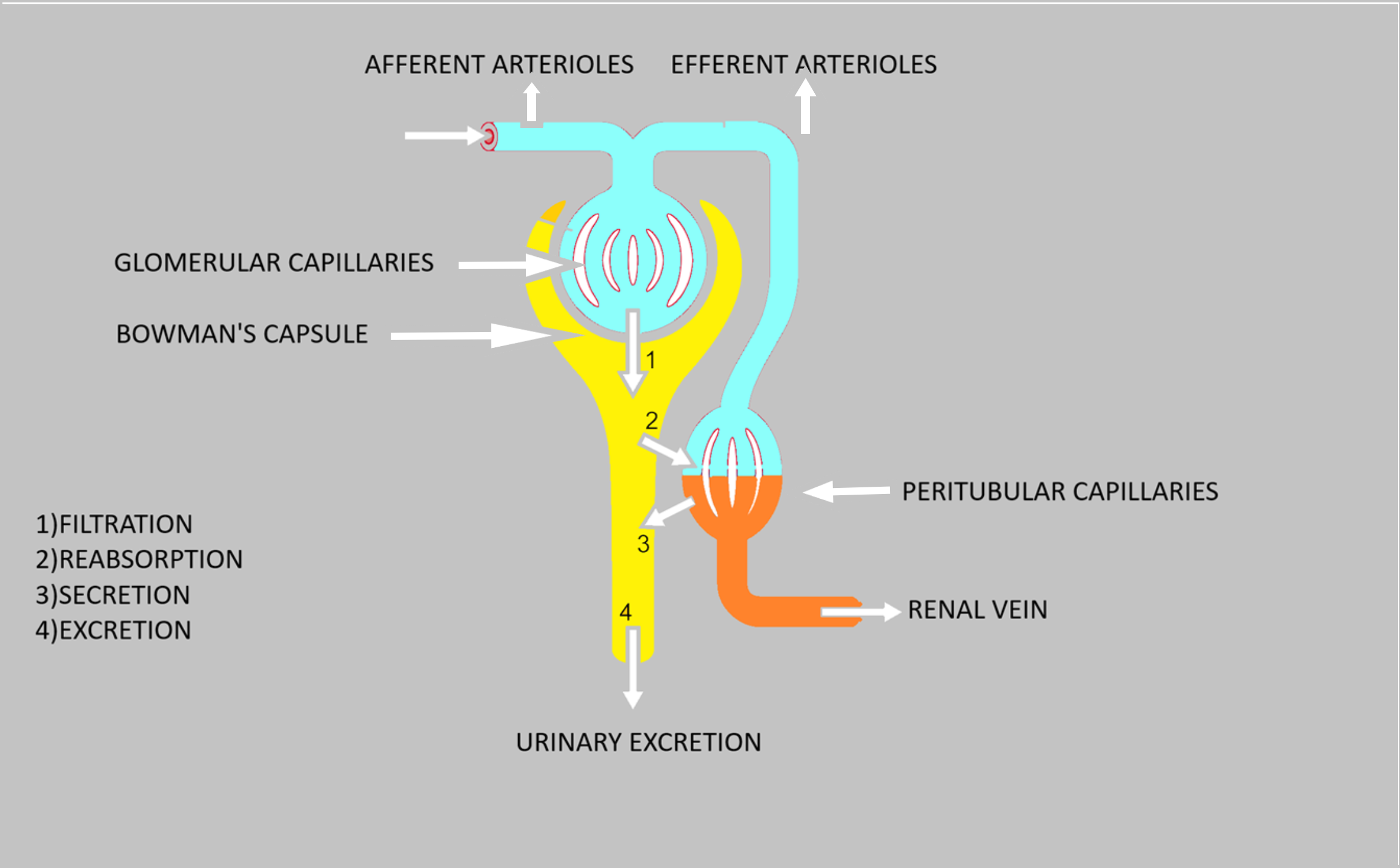
What is the unit of the excretory system?
Answer
591.3k+ views
Hint: This is present in the kidneys and its function is to filter the blood and excrete the waste materials as urine. In each kidney, these functional units are nearly 100,000 in number.
Complete answer:
The nephron is the basic functional and structural unit of the kidney. By filtering the blood, reabsorbing what is required, excreting the rest as urine and, controlling the water and soluble substances are the main function of the nephron.
- A nephron is the functional kidney unit that creates urine in the process of eliminating waste and excess substances from the blood. Each human kidney contains about 1,000,000 nephrons. The nephrons will filter five- quarter of water from the blood every 45 minutes. Just 1 1/2 quarts of that are excreted; the nephrons reabsorb the rest.
- Every mammalian nephron is a long tubule, or extremely fine tube, about 30–55 mm (1.2–2.2 inches) in length. This tube is closed, extended, and folded into a double- walled cuplike structure at one end. This structure called the renal corpuscle capsule, or Bowman's capsule, contains a network of small blood vessels — capillaries — called the glomerulus.
- Together the capsule and glomerulus make up the renal corpuscle. Blood passes through and out of the glomerulus through tiny arteries called arterioles that enter and exit the glomerulus through the capsule's open end. In the renal corpuscle, fluid filters out of the blood in the glomerulus through the capsule's inner wall and into the nephron tubules.
- As this filtrate passes through the tubule, the secretion of some compounds into it and the selective reabsorption of water and other constituents from it change its composition. The end result is urine, which is transferred into the renal pelvic through collecting tubules.
The image given below represents the excretory system. The 4 processes of excretion are filtration, absorption, secretion, and excretion.

Note: The most primitive nephrons are present in the extreme fish kidneys (pronephros), amphibian larvae, and more advanced vertebrate embryos. The nephrons present in amphibians and most fish's kidneys (mesonephros), and in the late embryonic development of more advanced vertebrates, are only marginally more advanced in form. The most advanced nephrons which exist in the adult kidneys, or metanephros of land vertebrates, such as reptiles, insects, and rodents.
Complete answer:
The nephron is the basic functional and structural unit of the kidney. By filtering the blood, reabsorbing what is required, excreting the rest as urine and, controlling the water and soluble substances are the main function of the nephron.
- A nephron is the functional kidney unit that creates urine in the process of eliminating waste and excess substances from the blood. Each human kidney contains about 1,000,000 nephrons. The nephrons will filter five- quarter of water from the blood every 45 minutes. Just 1 1/2 quarts of that are excreted; the nephrons reabsorb the rest.
- Every mammalian nephron is a long tubule, or extremely fine tube, about 30–55 mm (1.2–2.2 inches) in length. This tube is closed, extended, and folded into a double- walled cuplike structure at one end. This structure called the renal corpuscle capsule, or Bowman's capsule, contains a network of small blood vessels — capillaries — called the glomerulus.
- Together the capsule and glomerulus make up the renal corpuscle. Blood passes through and out of the glomerulus through tiny arteries called arterioles that enter and exit the glomerulus through the capsule's open end. In the renal corpuscle, fluid filters out of the blood in the glomerulus through the capsule's inner wall and into the nephron tubules.
- As this filtrate passes through the tubule, the secretion of some compounds into it and the selective reabsorption of water and other constituents from it change its composition. The end result is urine, which is transferred into the renal pelvic through collecting tubules.
The image given below represents the excretory system. The 4 processes of excretion are filtration, absorption, secretion, and excretion.

Note: The most primitive nephrons are present in the extreme fish kidneys (pronephros), amphibian larvae, and more advanced vertebrate embryos. The nephrons present in amphibians and most fish's kidneys (mesonephros), and in the late embryonic development of more advanced vertebrates, are only marginally more advanced in form. The most advanced nephrons which exist in the adult kidneys, or metanephros of land vertebrates, such as reptiles, insects, and rodents.
Recently Updated Pages
Master Class 11 Computer Science: Engaging Questions & Answers for Success

Master Class 11 Business Studies: Engaging Questions & Answers for Success

Master Class 11 Economics: Engaging Questions & Answers for Success

Master Class 11 English: Engaging Questions & Answers for Success

Master Class 11 Maths: Engaging Questions & Answers for Success

Master Class 11 Biology: Engaging Questions & Answers for Success

Trending doubts
One Metric ton is equal to kg A 10000 B 1000 C 100 class 11 physics CBSE

There are 720 permutations of the digits 1 2 3 4 5 class 11 maths CBSE

Discuss the various forms of bacteria class 11 biology CBSE

Draw a diagram of a plant cell and label at least eight class 11 biology CBSE

State the laws of reflection of light

Explain zero factorial class 11 maths CBSE




